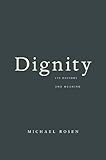Dignity : Its History and Meaning / Michael Rosen.
Material type: TextPublisher: Cambridge, MA : Harvard University Press, [2012]Copyright date: ©2012Edition: Ebook available to selected US libraries onlyDescription: 1 online resource (200 p.)Content type:
TextPublisher: Cambridge, MA : Harvard University Press, [2012]Copyright date: ©2012Edition: Ebook available to selected US libraries onlyDescription: 1 online resource (200 p.)Content type: - 9780674065512
- 179.7
- online - DeGruyter
| Item type | Current library | Call number | URL | Status | Notes | Barcode | |
|---|---|---|---|---|---|---|---|
 eBook
eBook
|
Biblioteca "Angelicum" Pont. Univ. S.Tommaso d'Aquino Nuvola online | online - DeGruyter (Browse shelf(Opens below)) | Online access | Not for loan (Accesso limitato) | Accesso per gli utenti autorizzati / Access for authorized users | (dgr)9780674065512 |
Frontmatter -- CONTENTS -- PREFACE -- REFERENCES AND ABBREVIATIONS -- 1. “THE SHIBBOLETH OF ALL EMPTY-HEADED MORALISTS” -- 2. THE LEGISLATION OF DIGNITY -- 3. DUTY TO HUMANITY -- NOTES -- INDEX
restricted access online access with authorization star
http://purl.org/coar/access_right/c_16ec
Dignity plays a central role in current thinking about law and human rights, but there is sharp disagreement about its meaning. Combining conceptual precision with a broad historical background, Michael Rosen puts these controversies in context and offers a novel, constructive proposal.Drawing on law, politics, religion, and culture, as well as philosophy, Rosen shows how modern conceptions of dignity inherit several distinct strands of meaning. This is why users of the word nowadays often talk past one another. The idea of dignity as the foundation for the universal entitlement to human rights represented the coming together after the Second World War of two extremely powerful traditions: Christian theology and Kantian philosophy. Not only is this idea of dignity as an “inner transcendental kernel” behind human rights problematic, Rosen argues, it has drawn attention away from a different, very important, sense of dignity: the right to be treated with dignity, that is, with proper respect. At the heart of the argument stands the giant figure of Immanuel Kant. Challenging current orthodoxy, Rosen’s interpretation presents Kant as a philosopher whose ethical thought is governed, above all, by the requirement of showing respect toward a kernel of value that each of us carries, indestructibly, within ourselves. Finally, Rosen asks (and answers) a surprisingly puzzling question: why do we still have a duty to treat the dead with dignity if they will not benefit from our respect?
Mode of access: Internet via World Wide Web.
In English.
Description based on online resource; title from PDF title page (publisher's Web site, viewed 01. Dez 2022)


